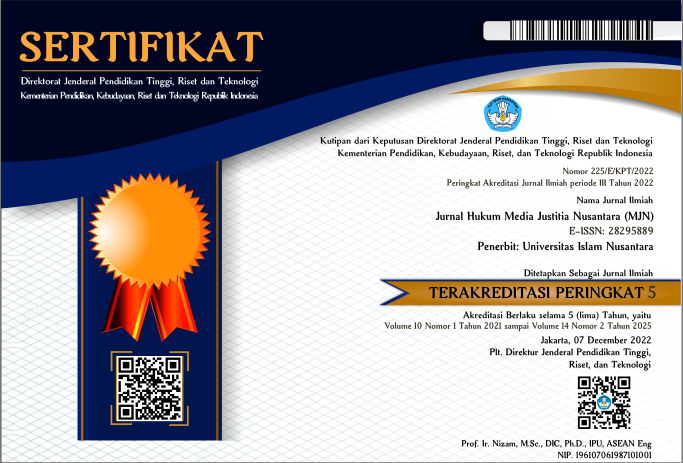Implementasi Pasal 10 Ayat (1) Jo Pasal 5 Ayat (1) Undang-Undang Nomor 48 Tahun 2009 Tentang Kekuasaan Kehakiman Yang Mewajibkan Hakim Untuk Menemukan Hukum Dikaitkan Dengan Putusan Mahkamah Konstitusi Republik Indonesia Nomor 46/PUU-XIV/2016
DOI:
https://doi.org/10.30999/mjn.v8i2.670Keywords:
Constitutional Court, Judicial Review, Criminal CodeAbstract
On December 14, 2017, the Constitutional Court declared Court Decision Number 46/PUU-XIV/2016, which rejected the petition for judicial review of Article 284, Article 285 and Article 292 of the Criminal Code for all submitted by the Petitioners. Consideration of Decision of the Constitutional Court Number 46/PUU-XIV/2016 which refused the application, one of which is that the Constitutional Court can not necessarily surpass its authority. The expansion of criminal law norms or criminalization is not the domain of the Constitutional Court's authority, but the legislators (DPR and President). Based on such background, this thesis would discuss: How to implement Article 10 paragraph (1) in conjunction with Article 5 paragraph (1) of Law Number 48 Year 2009 on Judicial Power which requires judges to find law related to Decision of the Constitutional Court of the Republic of Indonesia Number 46/PUU-XIV/2016, Dated December 14 2017 ?, and what is the impact after the issuance of Decision of the Constitutional Court of the Republic of Indonesia Number 46/PUU-XIV/2016, Date December 14, 2017? Specifications research was descriptive, with a normative juridical approach, a method in normative legal research used primary sources of secondary data, and it was carried out in one phase, namely the research literature, which was supported by interviews, and used collection techniques data, then after the secondary data including other supporting data,were inventoried, they analyzed by normatives-qualitative. As a result, the writer research found out that: The inconsistency of the five constitutional judges, as if limiting themselves to the concept of judicial restraint, and unwilling to make legal discovery or create a new law in the form of interpretation, because the Constitutional Court is positioned as a negative legislator, therefore Article 10 paragraph (1) jo Article 5 paragraph (1) of Law Number 48 Year 2009 on Judicial Power which requires judges to find law related to Decision of the Constitutional Court of the Republic of Indonesia Number 46/PUU-XIV/2016 has not been applied consistently, and Decision of the Constitutional Court Number 46/ PUU-XIV/2016 on December 14, 2017, declaring rejection of the petition for the amendment of the Criminal Code relating to the regulation of moral crime in Article 284 of the Criminal Code, Article 285 of the Criminal Code and Article 292 of the Criminal Code, for one reason in its consideration. The Constitutional Court could not automatically surpass its authority. The expansion of criminal law norms or criminalization was not the domain of the Constitutional Court's authority, but the legislators (DPR and President) authority, would certainly have the effect of giving loopholes and spatial debates in the discussion of the Draft Law on Penal Law currently being discussed in Parliament (DPR), whether obscene acts, both by and against same sex might be criminally or not in the Unitary State of the Republic of Indonesia, whose population is predominantly Muslim.
Downloads
Published
17-10-2019
How to Cite
Soeganda, S. (2019). Implementasi Pasal 10 Ayat (1) Jo Pasal 5 Ayat (1) Undang-Undang Nomor 48 Tahun 2009 Tentang Kekuasaan Kehakiman Yang Mewajibkan Hakim Untuk Menemukan Hukum Dikaitkan Dengan Putusan Mahkamah Konstitusi Republik Indonesia Nomor 46/PUU-XIV/2016. JURNAL HUKUM MEDIA JUSTITIA NUSANTARA, 8(2), 52–83. https://doi.org/10.30999/mjn.v8i2.670
Issue
Section
Article













